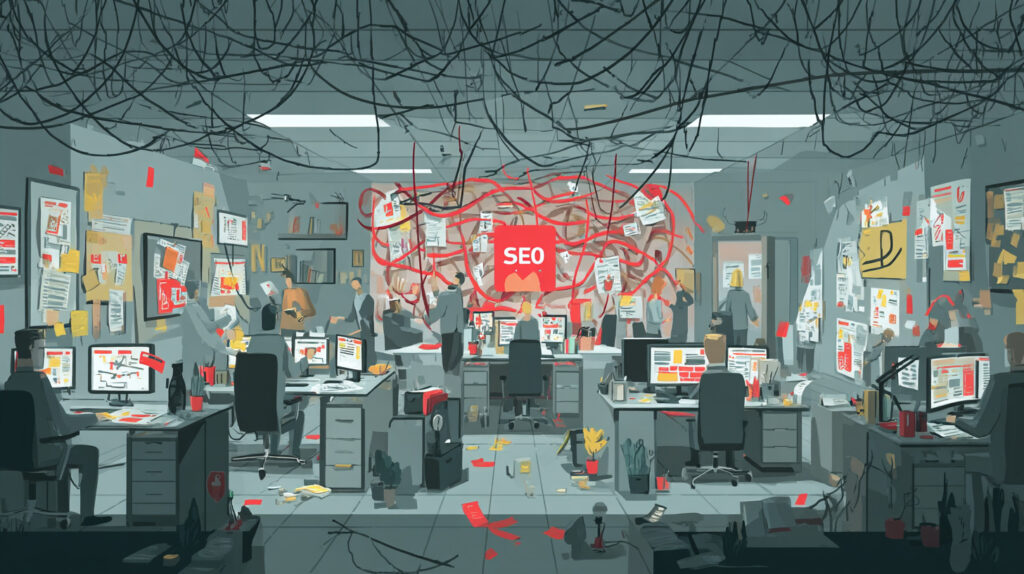Artificial Intelligence (AI) has been hailed as a game-changer across industries, with businesses eager to leverage its capabilities to streamline operations and cut costs. However, the notion that AI can seamlessly replace human expertise, particularly in specialised fields like Search Engine Optimisation (SEO), is misguided. Based on extensive testing of AI tools such as ChatGPT, Claude, and Gemini in various SEO tasks, it’s clear that AI is not ready to supplant human professionals. Businesses touting AI as a staff replacement should be approached with scepticism, as the technology’s limitations can lead to costly errors and inefficiencies. Below, I share my experiences testing AI in key SEO functions, highlighting its shortcomings and offering guidance for its responsible use.
Content Audits: A Time-Consuming Fix
One of the first areas I explored was using AI to perform content audits. The promise was appealing: rapid analysis of website content with actionable recommendations. However, the reality was far less impressive.
- Issue: AI outputs were riddled with errors. For instance, I received feedback on E-E-A-T (Expertise, Authoritativeness, Trustworthiness) suggesting the addition of author bios that were already present. Worse, AI hallucinated, generating feedback about non-existent content or incorrect facts.
- Outcome: Correcting these errors took longer than conducting the audit manually. The time spent verifying and fixing AI-generated feedback negated any potential efficiency gains.
This experience underscores a critical flaw: AI’s inability to consistently interpret context or verify facts makes it unreliable for tasks requiring precision.
Technical SEO: Misguided Recommendations
Next, I tested AI’s ability to provide feedback on technical SEO issues, feeding it data from tools like Screaming Frog. The results were mixed at best.
- Issue: While some recommendations were valid, AI frequently provided incorrect or misleading advice. For example, it made factually inaccurate statements about how Google interprets certain technical issues, such as crawl errors or redirect chains.
- Outcome: AI could be useful for generating specific, tailored recommendations—say, fixing a WordPress plugin issue or adjusting server configurations. However, its broader technical feedback was often unreliable and required careful scrutiny.
The inconsistency in AI’s technical SEO guidance highlights the need for human oversight. Relying solely on AI could lead to implementing harmful fixes that damage a site’s performance.
Search Console Data Analysis: Limited Scalability
Analysing Google Search Console (GSC) data is a core SEO task, and AI seemed like a natural fit for identifying trends and insights. However, its performance depended heavily on the scale of the data.
- Issue: AI performed adequately with smaller datasets, offering valuable insights into clicks, impressions, and keyword trends. However, with larger datasets, such as a GSC click gap analysis spanning thousands of rows, AI misreported figures, producing insights that didn’t align with manual assessments.
- Outcome: AI is viable for quick trend analysis on smaller websites, but only with rigorous double-checking. Its inaccuracies make it a risky choice for large-scale data.
This suggests AI can support data analysis but is not a substitute for human expertise, especially when handling complex or voluminous data.
Article Frameworks: Inconsistent but Usable
Creating article frameworks is an area where AI has shown more promise, likely due to its training on vast datasets that enable predictive content structuring.
- Issue: AI-generated frameworks were generally applicable but inconsistent. Some outputs were well-structured and relevant, while others missed the mark and required significant revisions.
- Outcome: Combining AI with deep research and custom datasets improved results. For instance, feeding AI my own data alongside competitor analysis produced viable frameworks, but interim checks were essential to ensure quality.
While AI can assist in content planning, its inconsistency means it’s not a plug-and-play solution. Human judgment remains critical to refine and validate outputs.
The Risks of Over-Reliance on AI
AI’s potential is undeniable, but its limitations pose significant risks, particularly in a field like SEO where accuracy and context are paramount. Two key concerns stand out:
- Not Human Intelligence: AI operates on predictive models, not proper understanding. It lacks the nuanced judgment of a human expert, leading to errors in complex or ambiguous scenarios.
- Hallucinations: AI’s tendency to generate fabricated or incorrect information can have serious consequences, from misleading clients to damaging a website’s rankings.
These risks make it clear that AI cannot be trusted as a standalone solution. Businesses that rely on it without proper safeguards risk delivering flawed services or advice.
Responsible Use of AI in SEO
To harness AI’s benefits while mitigating its risks, businesses should adopt a cautious, structured approach:
- Exercise Caution: Treat AI as a tool, not a replacement for human expertise. Use it to augment tasks, not to execute them autonomously.
- Implement Checks and Balances: Always verify AI outputs before acting on them. Establish rigorous review processes to catch errors, hallucinations, or inconsistencies.
- Limit Scope: Use AI for tasks that perform reliably, such as generating initial drafts or analysing small datasets. Avoid deploying it for high-stakes or complex tasks without human oversight.
Conclusion
AI has a role in SEO but is far from ready to replace human professionals. My experiences testing AI across content audits, technical SEO, data analysis, and article frameworks reveal a common theme: while AI can offer efficiency in specific contexts, its errors, inconsistencies, and hallucinations make it unreliable without human intervention.
Businesses that prioritise cost-cutting over quality by replacing staff with AI risk delivering subpar results that could harm their reputation and client outcomes.
Instead, AI should be used thoughtfully, augmenting human expertise with careful checks to ensure accuracy. In SEO, as in many fields, the human touch remains irreplaceable.




